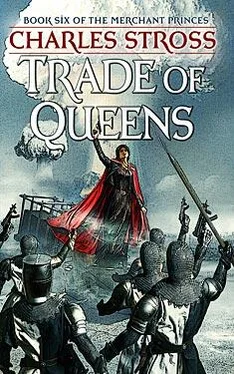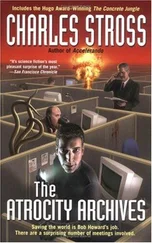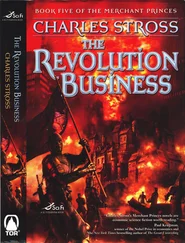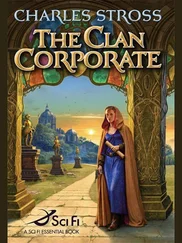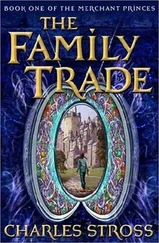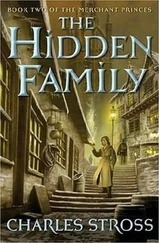Charles Stross - MP 6 -The Trade of Queens
Здесь есть возможность читать онлайн «Charles Stross - MP 6 -The Trade of Queens» весь текст электронной книги совершенно бесплатно (целиком полную версию без сокращений). В некоторых случаях можно слушать аудио, скачать через торрент в формате fb2 и присутствует краткое содержание. Жанр: Старинная литература, на английском языке. Описание произведения, (предисловие) а так же отзывы посетителей доступны на портале библиотеки ЛибКат.
- Название:MP 6 -The Trade of Queens
- Автор:
- Жанр:
- Год:неизвестен
- ISBN:нет данных
- Рейтинг книги:4 / 5. Голосов: 1
-
Избранное:Добавить в избранное
- Отзывы:
-
Ваша оценка:
- 80
- 1
- 2
- 3
- 4
- 5
MP 6 -The Trade of Queens: краткое содержание, описание и аннотация
Предлагаем к чтению аннотацию, описание, краткое содержание или предисловие (зависит от того, что написал сам автор книги «MP 6 -The Trade of Queens»). Если вы не нашли необходимую информацию о книге — напишите в комментариях, мы постараемся отыскать её.
MP 6 -The Trade of Queens — читать онлайн бесплатно полную книгу (весь текст) целиком
Ниже представлен текст книги, разбитый по страницам. Система сохранения места последней прочитанной страницы, позволяет с удобством читать онлайн бесплатно книгу «MP 6 -The Trade of Queens», без необходимости каждый раз заново искать на чём Вы остановились. Поставьте закладку, и сможете в любой момент перейти на страницу, на которой закончили чтение.
Интервал:
Закладка:
It was an anonymous and brutal counterattack, and left Sir Alasdair (and Commissioner Burgeson) with acid indigestion and disrupted sleep for some days, until the last of the bodies pulled from the rubble could finally be identified. If either ven Hjalmar or Reynolds had realized in time that their location had been betrayed, the operation might have failed, as would the cover story: a despicable Royalist cell's attack on the Peace and Justice Subcommittee's leading light, the heroic death of Commissioner Reynolds as he led the blackcoats in a spirited defense of the People's Revolution, and the destruction of the dastardly terrorists by their own bombs. But it
was
a success. And as the cover-up operation proceeded—starting with the delivery of the captives held on board the
Burke
to a rather different holding area ashore, under the control of guards outside the chain of command of the Directorate of Internal Security—the parties to the fragile conspiracy were able to breathe their respective sighs of relief.
The worst was over; but now the long haul was just beginning.
It was a humid morning near Boston; with a blustery breeze blowing, and cloud cover lowering across the sky, fat drops of rain spattered across the sidewalk and speckled the gray wooden wall of the compound.
The wall around the compound had sprung up almost overnight, enclosing a chunk of land on the green outskirts of Wellesley—land which included a former Royal Ordnance artillery works, and a wedge of rickety brick row houses trapped between the works and the railroad line. One day, a detachment of Freedom Guards had showed up and gone door to door, telling the inhabitants that they were being moved west with their factory, moving inland towards the heart of the empire, away from threat of coastal invasion. There had been no work, and no money to pay the workers, for five months; the managers had bartered steel fabrications and stockpiled gun barrels for food to keep their men from starvation. Word that the revolutionary government did indeed want them to resume production, and had prepared a new home for them and would in due course feed and pay them, overcame much resistance. Within two days the district's life had drained away on flatbeds and boxcars, rolling west towards a questionable future. The last laborers to leave had pegged out the line of the perimeter; the first to arrive unloaded timber from the sidings by the arsenal and began to build the wall and watchtowers. They did so under the guns of their camp guards, for these men were prisoners, captured royalist soldiers taken by the provisional government.
After they'd built the walls of the prison they'd occupy, and the watchtowers and guardhouses for their captors, the prisoners were set to work building their own cabins on the empty ground between two converging railroad tracks. These, too, they built walls around. They built lots of walls; and while they labored, they speculated quietly among themselves about who would get the vacant row houses.
They did not have long to wait to find out.
Family groups of oddly dressed folk, who spoke haltingly or with a strong Germanic accent, began to arrive one morning. The guards were not obsequious towards them, exactly, but it was clear that their position was one of relative privilege. They had the haunted expressions of refugees, uprooted from home and hearth forever. Some of them seemed resentful and slightly angry about their quarters, which was inexplicable: The houses were not the mansions of rich merchants or professionals, but they were habitable, and had sound roofs and foundations. Where had they come from? Nobody seemed to know, and speculation was severely discouraged. After a couple of prisoners disappeared—one of them evidently an informer, the other just plain unlucky—the others learned to keep their mouths shut.
The prisoners were kept busy. After a few more carriage-loads of displaced persons arrived, some of the inmates were assigned to new building work, this time large, well-lit drafting offices illuminated by overhead skylights. Another gang found themselves unloading wagonloads of machine tools, lightweight precision-engineering equipment to stand beside the forges and heavy presses left behind by the artillery works. Something important was coming, that much was clear. But what? "What is this—hovel?" demanded the tall woman with the babe in arms, pausing on the threshold. She spoke hochsprache, with an aristocratic Northern accent; the politicals in their striped shirts, burdened beneath her trunk, didn't understand her.
Heyne shrugged, then turned to the convicts. "Leave it here and report back to barracks," he told them, speaking English. He watched as they deposited the trunk, none too softly, and shuffled away with downturned faces. Then he gestured back into the open doorway. "It's where you're going to live for a while," he told her bluntly. "Be thankful; this nation's in the grip of revolt, but you've got a roof over your head and food on the table, and guards to keep you safe."
"But I—" Helena yen Wu stepped inside and looked around. Raw brick faced with patches of crumbling plaster stared back at her; bare boards creaked underfoot.
The other woman was more practical. "Help me move this inside?" she said, looking up at him as she bent over one end of the trunk. The boy, free of her hand, dashed inside and thundered up the stairs, shouting excitedly.
"Certainly, my lady." Heyne picked up the other end of the trunk and helped her maneuver it past the other woman. It gave them both a polite excuse to ignore her hand-wringing dismay.
"Is there any bedding? Or furniture?" she asked quietly.
"Probably not." They finished shoving the trunk against the inner wall of the front room, and Heyne straightened up. "The previous tenants shipped out a week since, and stripped their houses of anything worth taking. The matter's in hand, though. We've got plenty of labor from the politicals in the workshop. Tell me the basics you need and I'll put in an order for it." He looked around. "Hmm. They
really
stripped this one." Walking through into the kitchen, he tutted. "Complete kitchen set, table and chairs, pots, a stove if we can find one. Beds"—he glanced over his shoulder—"for three of you." Walking to the back, he stared through the grimy window into the yard. "Chamber pots. Let's check the outhouse."
Outside in the sunlight, Kara spoke quietly. "I know we're refugees, dependent on the generosity of strangers. But Helena can't be the first like this . . . ?"
Heyne glanced back at the terraced house and shook his head. "No, she isn't. Most people go through something like it, sooner or later; but they get over it eventually." He looked back at the outhouse. "Good, they left the toilet seat. My lady, I know this accommodation is not up to your normal standards, but the fact is, we're beginning again from scratch, with barely any resources. We're lucky enough that Her Majesty negotiated a settlement with the revolutionaries that gives us this compound, and resources to . . . well, I'm not sure I can talk about that. But we're welcome here for now, anyway, and we're not going to starve." He turned and headed back through the kitchen door, glanced through into the front room—where Helena was sitting on the trunk, rocking slowly from side to side—and then climbed the creaking staircase to the top floor and the two cramped bedrooms below the attic.
The young boy was still crawling around the empty south-facing bedroom, jumping up and down and making-believe in some exciting adventure. Heyne tested the windows. "The glass is all here and the windows open. Good."
"How long will we be here?" Kara asked bluntly.
"As long as they want to keep us." He shrugged. "You don't want to go back home, my lady." His eyes lingered a moment too long on her stomach. "Not now, maybe not ever."
Читать дальшеИнтервал:
Закладка:
Похожие книги на «MP 6 -The Trade of Queens»
Представляем Вашему вниманию похожие книги на «MP 6 -The Trade of Queens» списком для выбора. Мы отобрали схожую по названию и смыслу литературу в надежде предоставить читателям больше вариантов отыскать новые, интересные, ещё непрочитанные произведения.
Обсуждение, отзывы о книге «MP 6 -The Trade of Queens» и просто собственные мнения читателей. Оставьте ваши комментарии, напишите, что Вы думаете о произведении, его смысле или главных героях. Укажите что конкретно понравилось, а что нет, и почему Вы так считаете.
